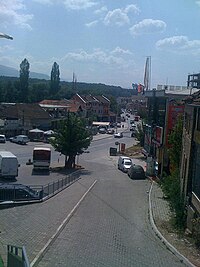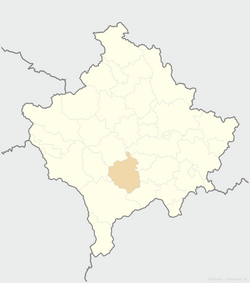Suva Reka
Suva Reka Сува Река/Suva Reka (Serbian) Suhareka or Suharekë, Theranda or Therandë (Albanian) | ||
|---|---|---|
Town and municipality | ||
| Komuna e Gjilanit = | ||
 The street that runs through the city's center | ||
| ||
 Location of the municipality of Suva Reka within Kosovo | ||
| Coordinates: 42°22′48″N 20°49′19″E / 42.38000°N 20.82194°E / 42.38000; 20.82194Coordinates: 42°22′48″N 20°49′19″E / 42.38000°N 20.82194°E / 42.38000; 20.82194 | ||
| Country | Kosovo[a] | |
| District | District of Prizren | |
| Government | ||
| • Mayor | Bali Muharremaj | |
| • Municipal | 361 km2 (139 sq mi) | |
| Elevation | 389 m (1,276 ft) | |
| Population (2011) | ||
| • Urban | 10,422 | |
| • Municipal | 59,722 | |
| • Municipal density | 170/km2 (430/sq mi) | |
| Time zone | UTC+1 (CET) | |
| • Summer (DST) | UTC+2 (CEST) | |
| Postal code | 23000 | |
| Area code(s) | +383 29 | |
| Car plates | 04 | |
| Climate | Cfb | |
| Website | kk.rks-gov.net/suhareke | |
Suva Reka (Serbian Cyrillic: Сува Река), or Suhareka or Theranda (Albanian: Suharekë or Therandë), is a town and municipality located in the Prizren district of central-southern Kosovo.[a] According to the 2011 census, the town has 10,422 inhabitants, while the municipality has 59,722 inhabitants.
Suva Reka is located 18 km (11 mi) from the city of Prizren, and 57 km (35 mi) from Kosovo's capital, Pristina.
Contents
1 Name
2 History
2.1 Historical background
2.2 Yugoslav period
2.3 Kosovo War and aftermath
3 Culture
3.1 Churches
4 Demographics
5 Twin towns – Sister cities
6 Notes and references
7 External links
Name
Suva Reka means "dry river" in Serbian.[1] The Albanian spellings are Suharekë[2] or Suhareka (derived from Serbian), while an alternative[3] name was recently created by the Albanological Institute,[4]Therandë,[5] adopted from an unlocated Roman site (possibly in Suva Reka or Ljubižda in the Miruša valley[6]), as part of the Albanian nationalistic renaming of Serbian placenames (itself part of state-building Kosovo as Albanian).[7]
History
Historical background
The municipality includes several medieval Serbian sites and old settlements, such as the villages of Banja, Dulje, Mušutište, Popovljane, Rečane, and churches of Virgin Hodegetria, St. George, Holy Trinity, St. Nicholas, among others. The settlement of Suva Reka itself was first mentioned in 1465.
Yugoslav period
From 1929 to 1941, Suva Reka was a village part of the Vardar Banovina of the Kingdom of Yugoslavia.
On the night of 9–10 June 1984, ethnic Albanians desecrated 29 tombstones of the Church of the Holy Saviour.[8][9]
Kosovo War and aftermath
During the Kosovo War (1998–99), the Kosovo Liberation Army (KLA) operated in the region and it was reported that it had killed and wounded several Serbian policemen and civilians. Among KLA attacks against police officers recorded in 1998 in the municipality were: on 16 August in Blace (one badly wounded), on 23 August in Dulje (three badly, four lightly wounded) and in Reštane (one badly wounded), on 25 August in Dulje (one badly wounded), on 28 September in Budakovo (three badly wounded) and in Vranić (one lightly wounded).[10] KLA shot at an OSCE vehicle driving behind a FR Yugoslav military convoy between Suva Reka and Štimlje on 5 November 1998.[11] In 10–16 January 1999, FR Yugoslav forces conducted counter-insurgency operations in Suva Reka.[12]UNHCR estimated on 18 March 1999 that the Suva Reka municipality had 6,100 displaced and 5,600 returns.[13] On 25 March, the town was surrounded by the Yugoslav army and police, and U.S. documents claim reports of at least 30 Albanians killed.[14] There were reports that Serb forces extorted Albanians in Belanica on 27 March.[15] In April and May 1999, Serb paramilitary repeatedly attacked the villages in the municipality, forcing the population to leave and gather in KLA territory.[15] On 11–12 June 1999, a Serb family of four was kidnapped in Dvorane and never located.[16][17] On 12 June 1999, KLA attacked Mušutište and kidnapped eighteen Serb civilians.[18][19]
After the war, Serbian heritage was destroyed all over Kosovo; the churches (including cemeteries) of Virgin Hodegetria, St. George, Holy Trinity, St. Nicholas and others were completely destroyed in 1999 after the arrival of KFOR (and end of war).[20]
NATO set up a military base in the municipality, Camp Casablanca.
Culture
Churches
Church of the Virgin Hodegetria, Mušutište, built 1315, destroyed 1999
Church of St. George, Rečane, built in the 14th century, destroyed 1999
Church of the Holy Trinity, Mušutište, built before 1465, destroyed 1999
Church of the Holy Saviour, Mušutište, built in 1465, destroyed 1999
Church of St. Nicholas, Popovljane, built in 1626, destroyed 1999
Church of Archangel Michael, Dvorane, built in the 19th century, destroyed 1999
Church of the Holy Saviour, Dvorane, built in the 19th century, destroyed 1999
Church of the Holy Apostles Peter and Paul, Suva Reka, built 1938, destroyed 1999
Church of St. Parascheva, Mušutište, built 1973, destroyed 1999
Demographics
| Municipal historical population | ||
|---|---|---|
| Year | Pop. | ±% p.a. |
| 1948 | 27,044 | — |
| 1953 | 30,184 | +2.22% |
| 1961 | 34,729 | +1.77% |
| 1971 | 45,316 | +2.70% |
| 1981 | 59,434 | +2.75% |
| 1991 | 72,229 | +1.97% |
| 2011 | 59,722 | −0.95% |
| 2016 est. | 59,681 | −0.01% |
| Source: Division of Kosovo | ||
According to the 2011 census done by the Government of Kosovo, the municipality of Suhareka had 59,722 inhabitants of which 98.9% were Kosovo Albanians.[21] However, these results should be taken with caution, due to the partial boycott by Kosovo Serbs. According to OSCE, the whereabouts of the displaced Serb and Roma communities is unknown.[22]
Twin towns – Sister cities
Suva Reka is twinned with:
 Sarandë, Albania
Sarandë, Albania
 Fellbach, Germany[23]
Fellbach, Germany[23]
 Lilburn, United States[24]
Lilburn, United States[24]
Notes and references
- Notes
^ ab Kosovo is the subject of a territorial dispute between the Republic of Kosovo and the Republic of Serbia. The Republic of Kosovo unilaterally declared independence on 17 February 2008, but Serbia continues to claim it as part of its own sovereign territory. The two governments began to normalise relations in 2013, as part of the Brussels Agreement. Kosovo is recognized as an independent state by 103 out of 193 United Nations member states.
- References
^ Grujić, Petar V. (2014). Kosovo knot. Pittsburgh: Dorrance Publishing. p. 248. ISBN 9781480998452..mw-parser-output cite.citation{font-style:inherit}.mw-parser-output .citation q{quotes:"""""""'""'"}.mw-parser-output .citation .cs1-lock-free a{background:url("//upload.wikimedia.org/wikipedia/commons/thumb/6/65/Lock-green.svg/9px-Lock-green.svg.png")no-repeat;background-position:right .1em center}.mw-parser-output .citation .cs1-lock-limited a,.mw-parser-output .citation .cs1-lock-registration a{background:url("//upload.wikimedia.org/wikipedia/commons/thumb/d/d6/Lock-gray-alt-2.svg/9px-Lock-gray-alt-2.svg.png")no-repeat;background-position:right .1em center}.mw-parser-output .citation .cs1-lock-subscription a{background:url("//upload.wikimedia.org/wikipedia/commons/thumb/a/aa/Lock-red-alt-2.svg/9px-Lock-red-alt-2.svg.png")no-repeat;background-position:right .1em center}.mw-parser-output .cs1-subscription,.mw-parser-output .cs1-registration{color:#555}.mw-parser-output .cs1-subscription span,.mw-parser-output .cs1-registration span{border-bottom:1px dotted;cursor:help}.mw-parser-output .cs1-ws-icon a{background:url("//upload.wikimedia.org/wikipedia/commons/thumb/4/4c/Wikisource-logo.svg/12px-Wikisource-logo.svg.png")no-repeat;background-position:right .1em center}.mw-parser-output code.cs1-code{color:inherit;background:inherit;border:inherit;padding:inherit}.mw-parser-output .cs1-hidden-error{display:none;font-size:100%}.mw-parser-output .cs1-visible-error{font-size:100%}.mw-parser-output .cs1-maint{display:none;color:#33aa33;margin-left:0.3em}.mw-parser-output .cs1-subscription,.mw-parser-output .cs1-registration,.mw-parser-output .cs1-format{font-size:95%}.mw-parser-output .cs1-kern-left,.mw-parser-output .cs1-kern-wl-left{padding-left:0.2em}.mw-parser-output .cs1-kern-right,.mw-parser-output .cs1-kern-wl-right{padding-right:0.2em}
^ "Suhareke". kk.rks-gov.net. Retrieved 12 April 2018.
^ Robert Elsie (15 November 2010). Historical Dictionary of Kosovo. Scarecrow Press. pp. 298–. ISBN 978-0-8108-7483-1.
^ Saskia Drude (2008). Hundert Wochen Kosovo: Alltag in einem unfertigen Land. Karin Fischer Verlag. pp. 99–. ISBN 978-3-89514-836-1.
^ Elsie,R. Historical Dictionary of Kosovo. p. 268.
^ Arheološko blago Kosova i Metohije: Text. Srpska Akademija nauka i umetnosti. 1998. p. 286.
^ Andreas Wittkowsky (2011). Grand Hotel Kosovo: Schlaglichter einer europäischen Staatsbildung. LIT Verlag Münster. pp. 69–. ISBN 978-3-643-11425-9.
^ "—". Православље. 1 February 1985. Archived from the original on 27 November 2011.
^ Antonije Isaković (1990). "Kosovsko-metohijski zbornik". SANU: 84.
^ Members of the Ministry of the Interior - Victims of Albanian Terrorism in 1998, March 10, 1999
^ Krieger 2001, p. 227.
^ Krieger 2001, p. 248.
^ Krieger 2001, p. 67.
^ Krieger 2001, pp. 88, 528.
^ ab Krieger 2001, p. 56.
^ Government of the Republic of Serbia, SPISAK KIDNAPOVANIH I NESTALIH LICA NA KOSOVU I METOHIJI
^ Plarre, Wolfgang. "ABDUCTIONS-7-010417.htm HLC - Humanitarian Law Center - Abductions and Disappearances of non-Albanians in Kosovo - copy on 17 April 2001". www.bndlg.de. Retrieved 12 April 2018.
^ "Kosovo (1998-2000)". zrtveratovasfrj.info (in Serbian). Retrieved 2 September 2017.
^ "Српско село Мушутиште на КиМ: Старци бачени у бунаре, манастир порушен" [Serb village Mušutište, in Kosovo: elders were thrown into wells, monastery demolished]. srbijadanas.net (in Serbian). 1 June 2015. Retrieved 2 September 2017.
^ Влада Републике Србије за Косово и Метохију. "Уништена и оштећена културна добра на Косову и Метохији у периоду од 1999. до 2004. године" (PDF).
^ http://www.osce.org/kosovo/13131?download=true
^ Cite error: The named referenceosce2015was invoked but never defined (see the help page).
^ "Komuna Suhareke - Suhareka & Fellbach". kk.rks-gov.net. Retrieved 2017-01-31.
^ "Lilburn Becomes a 'Sister City' With Kosovo Town". patch.com. 16 July 2013. Retrieved 12 April 2018.
External links
| Wikimedia Commons has media related to Suva Reka. |
- Municipality of Suhareka
- OSCE municipal profile of Suva Reka
- SOK Kosovo and its population

